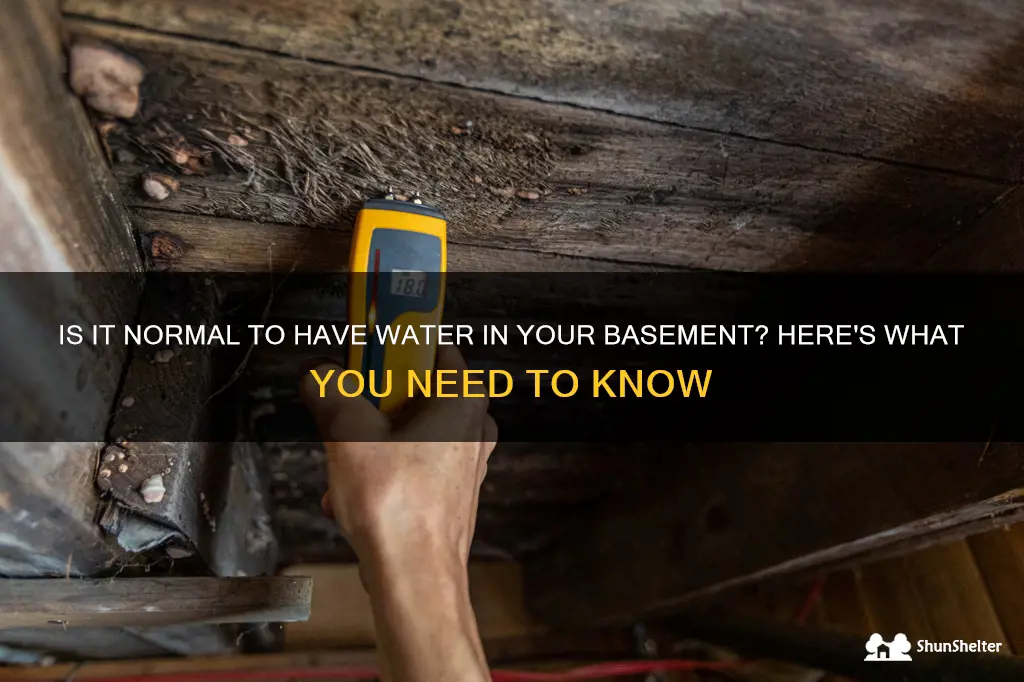
Having water in the basement is a common issue that many homeowners face, but is it normal? Whether it's caused by heavy rain, plumbing issues, or other factors, water in the basement can be a cause for concern. In this article, we will explore the reasons why water enters the basement and discuss whether it is a normal occurrence or something that needs to be addressed.
| Characteristics | Values |
|---|---|
| Causes | Yes |
| Common Solutions | No |
| Prevention Tips | Yes |
| Severity | High |
| Frequency | Often |
| Damage Potential | High |
| Health Risks | Yes |
| Effected Areas | Basement |
| Waterproofing | Necessary |
| Drainage System | Important |
What You'll Learn

Causes of Water in Basement
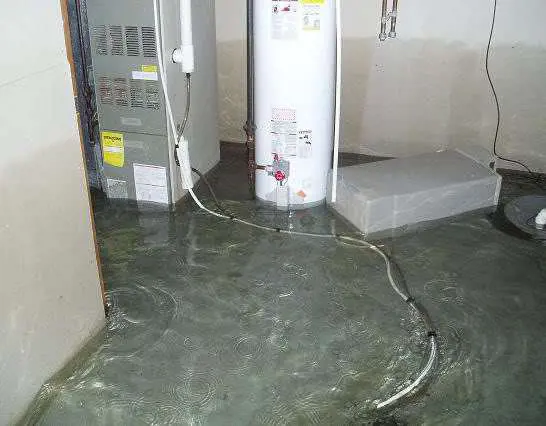
One common problem that many homeowners face is the presence of water in their basement. This can be a frustrating and concerning issue, especially if you are unsure of the cause. In this blog post, we will explore some of the most common causes of water in the basement, so you can better understand why this may be happening and take appropriate measures to address the issue.
- Poorly sealed foundation: A common cause of water in the basement is a poorly sealed foundation. Over time, the seal between the foundation and the surrounding soil can deteriorate, allowing water to seep into the basement. This can be exacerbated by heavy rain or a high water table. To address this issue, it is important to inspect the foundation and repair any cracks or gaps. Additionally, consider applying a waterproofing sealant to help prevent future water intrusion.
- Inadequate drainage: Another common cause of water in the basement is inadequate drainage around the home. If the soil around your home does not slope away from the foundation or if your gutters and downspouts are clogged or not directing water away from the house, water can accumulate around the foundation and find its way into the basement. To address this issue, ensure that the ground slopes away from the foundation and that your gutters and downspouts are functioning properly. Consider installing a French drain or a sump pump to further assist with drainage.
- Poorly sealed windows or doors: Leaking windows or doors can also be a source of water in the basement. If the seals around your windows and doors are compromised, water can seep into the basement during rainstorms or when snow melts. Inspect the seals around your windows and doors and replace any that appear damaged or worn. It may also be beneficial to install window wells to provide additional protection against water intrusion.
- Cracks in the basement walls or floor: Cracks in the basement walls or floor can also be a source of water in the basement. These cracks can occur naturally over time or as a result of pressure from the soil or hydrostatic pressure. It is essential to address these cracks as they can allow water to seep into the basement and cause further damage. Depending on the severity of the cracks, repair options may include patching with hydraulic cement, injecting epoxy or polyurethane, or installing carbon fiber straps for reinforcement.
- Plumbing leaks: Lastly, plumbing leaks can also be a cause of water in the basement. If there are water supply or drain pipes in the basement, a leak in these pipes can lead to water accumulation. If you suspect a plumbing leak, it is important to inspect the pipes and fix any leaks immediately. In some cases, you may need to enlist the help of a professional plumber to identify and repair the source of the leak.
In conclusion, water in the basement is not a normal occurrence and should be addressed promptly to prevent further damage and potential health hazards. By understanding the common causes of water in the basement and taking appropriate measures to address them, you can ensure that your basement remains dry and free from any water-related issues. Remember to consult with professionals if you are unsure about the appropriate course of action or if the issue persists despite your efforts.
The Top Solutions for Sealing Around a PVC Pipe Penetrating Your Basement Wall
You may want to see also

Signs and Symptoms of Water Damage in Basements
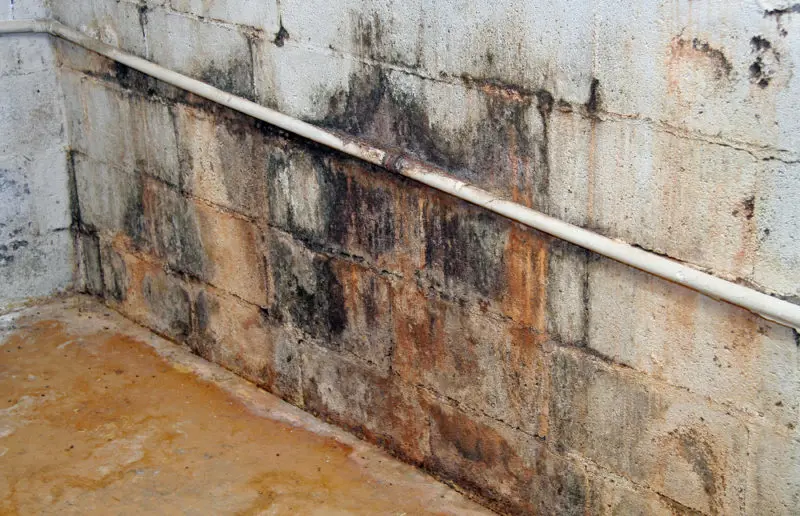
A basement is a common area in many houses that often goes unnoticed until there is a problem. One such problem that homeowners may encounter is water damage. Water seepage in the basement can lead to serious issues if left untreated, so it's crucial to be aware of the signs and symptoms of water damage. In this article, we will discuss some common indicators that your basement may be experiencing water damage.
Damp or Musty Odor:
One of the first signs of water damage in the basement is a damp or musty odor. If you walk into your basement and are greeted with a musty smell, it's possible that water is seeping in. This odor is often caused by mold or mildew growth, which thrives in damp environments.
Visible Water Stains:
Water stains are telltale signs of water damage. Look for discolored patches or streaks on the walls, ceiling, or floor of your basement. These stains may appear yellow, brown, or even black, depending on the extent of the water damage. Water stains are not only unsightly but can also signal ongoing water infiltration.
Efflorescence:
Efflorescence is a white, powdery substance that appears on masonry surfaces such as bricks, concrete, or stone. It is caused by water evaporating from these materials and leaving behind salt deposits. If you notice efflorescence on your basement walls or floor, it is a clear sign that water is present in your basement.
Cracks in Walls or Floor:
Water pressure can cause cracks to develop in the basement walls or floor. These cracks may be vertical, horizontal, or even diagonal. Over time, water can seep through these cracks, exacerbating the problem. If you spot any cracks, no matter how small, it is essential to address them promptly to prevent further water damage.
Mold or Mildew Growth:
Mold and mildew are common in damp environments such as basements. If you notice black or green patches of mold on the walls, floor, or ceiling, it is a clear indicator of water damage. Mold growth not only damages the structure but can also pose health risks to the occupants of the house.
Peeling or Blistering Paint:
Excessive moisture in the basement can cause paint to peel or blister. If you see bubbling, flaking, or peeling paint on the walls, it might be due to water infiltration. This occurs because water weakens the bond between the paint and the surface, leading to paint failure.
Wet or Damp Carpet:
If your basement has carpeting, a wet or damp carpet is a sign of water damage. Carpet fibers are porous and can absorb water like a sponge. Moisture trapped in the carpet can lead to mold growth and deterioration of the carpet padding and subfloor if not addressed promptly.
It's worth noting that some of these signs may not be immediately apparent if water damage is occurring behind finished walls or under carpeting. In such cases, it is crucial to regularly check for any aforementioned signs to catch water damage early.
If you notice any of these signs and symptoms of water damage in your basement, it is essential to take action immediately. Ignoring the problem or delaying repairs can lead to further damage and more costly repairs down the line. Consult with a professional water damage restoration company to assess the situation, identify the source of water intrusion, and recommend the appropriate course of action. Remember, early intervention is key to minimizing the impact of water damage and preserving the integrity of your basement.
Why Are Millipedes Finding Their Way Into My Basement?
You may want to see also

Potential Risks and Dangers of Water in Basements
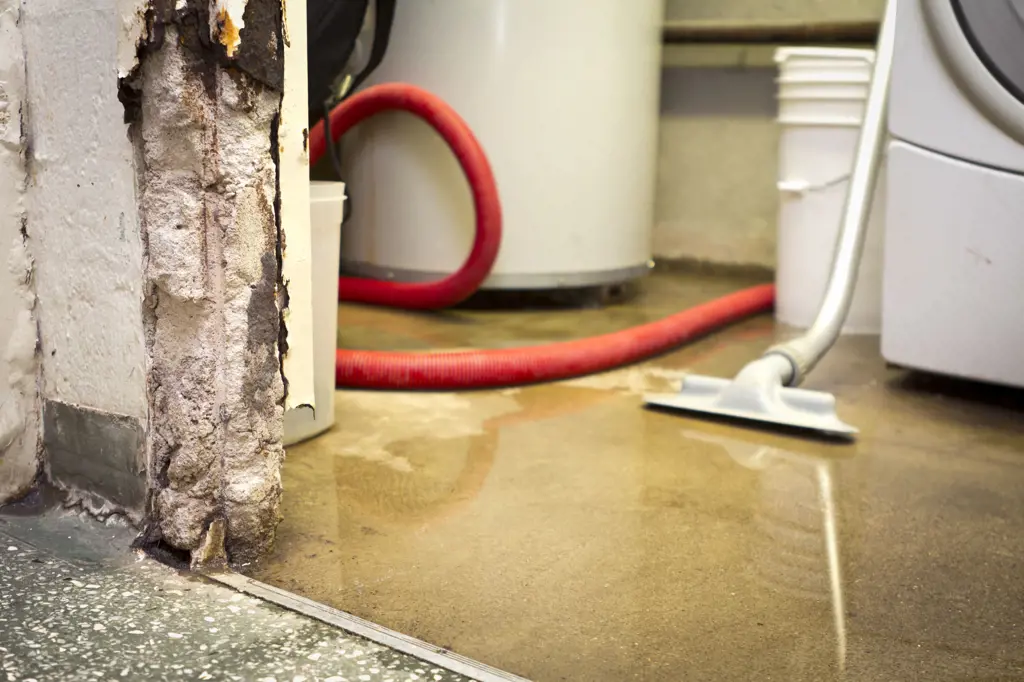
Water in the basement can be a frustrating and potentially dangerous problem. Not only can it lead to costly repairs and damage to your belongings, but it can also pose health risks if not addressed promptly. Understanding the potential risks and dangers of water in basements is essential for every homeowner.
One of the most immediate concerns with water in the basement is the damage it can cause to the foundation of your home. Constant exposure to water can weaken the foundation, leading to cracks and structural issues. These can be costly to repair and may even compromise the stability and safety of your home.
Water in the basement can also create an ideal breeding ground for mold and mildew. These fungi thrive in damp and dark environments, and basements often provide just that. Breathing in mold spores can trigger allergies, worsen existing respiratory conditions, and even cause infections. Furthermore, prolonged exposure to mold can lead to long-term health problems, such as asthma and other respiratory issues.
Another significant risk of water in basements is the potential damage it can cause to electrical systems. If water comes into contact with electrical wiring, it can lead to a short circuit or even a fire. This can put your home and your family in danger. To avoid this risk, it is crucial to have any electrical outlets or appliances elevated above potential water levels and to ensure that all electrical systems are far away from any moisture sources.
Water in the basement can also provide an entry point for pests such as insects and rodents. These unwanted guests are attracted to damp and dark places, and a wet basement can be the perfect invitation. Once inside, they can cause further damage to your home, and some pests can even pose health risks through bites, stings, or spreading diseases.
Additionally, water in the basement can damage any valuables or belongings you store there. Things such as furniture, appliances, family heirlooms, and important documents can be ruined by water damage. Not only will you have the cost of repairing or replacing these items, but you may also lose sentimental items that are irreplaceable.
To address these potential risks and dangers, it is crucial to address any water issues in your basement promptly. There are several proactive steps you can take to prevent and mitigate water damage. Ensuring proper drainage around the foundation of your home, fixing any leaks or cracks in the basement walls or floors, installing a sump pump, and keeping the basement well-ventilated are all effective measures.
In some cases, it may be necessary to consult a professional to address the underlying causes of water in the basement. They can assess the situation, identify the source of the water, and provide appropriate solutions, such as waterproofing or installing a drainage system.
In conclusion, water in the basement is not a normal occurrence and should not be ignored. The potential risks and dangers associated with water in basements extend beyond structural damage and can impact your health and safety. By taking preventive measures and addressing water issues promptly, you can protect your home and your loved ones from these risks.
Creative Ways to Beautify the Outside of Exposed Basement Walls
You may want to see also

Prevention and Solutions for Basement Water Issues
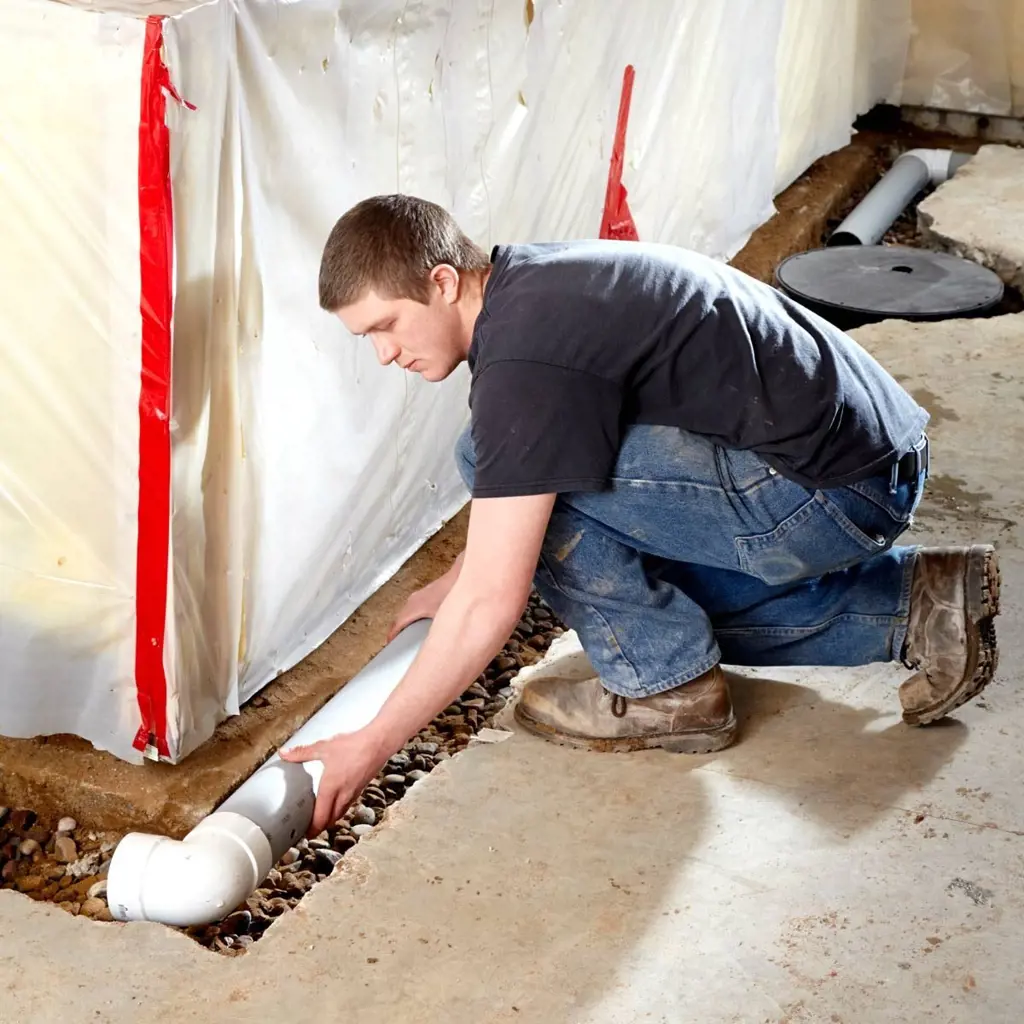
Basement water issues can be a major headache for homeowners. Not only can they cause damage to the belongings and structural integrity of your home, but they can also create a breeding ground for mold and mildew. It's important to address any water issues in your basement as soon as possible to prevent further damage and ensure a clean and dry living space.
In this blog post, we will discuss some common causes of basement water issues and provide useful prevention and solution strategies to help you keep your basement dry and worry-free.
Poor Drainage System:
One of the most common causes of basement water issues is poor or improper drainage around your home. If your home is not properly graded, water can accumulate near the foundation and seep into your basement. To prevent this, make sure the ground around your home slopes away from the foundation, allowing water to run off and drain properly. In addition, consider installing gutter extensions and downspout diverter to redirect water away from the foundation.
Cracks in Foundation Walls:
Another common cause of basement water issues is cracks in the foundation walls. Over time, as the soil expands and contracts, it can put pressure on the walls, causing them to crack. These cracks can allow water to seep into your basement. Regularly inspect your foundation walls for any signs of cracks and have them repaired promptly to prevent further water infiltration.
Clogged Gutters and Downspouts:
Clogged gutters and downspouts can also contribute to basement water issues. When these channels get blocked by debris, water can overflow and spill directly onto the foundation, increasing the risks of water seepage into your basement. Regularly clean and maintain your gutters and downspouts to ensure proper water flow and prevent water damage in your basement.
Inadequate Waterproofing:
If your basement is not properly waterproofed, it can be prone to water issues. Consider applying waterproof paint or sealant on your basement walls and floors to create a barrier against water infiltration. Additionally, installing a sump pump and French drain can help collect and redirect water away from your basement, further protecting it from water damage.
Plumbing Leaks:
Sometimes, the source of your basement water issues may not be external. Plumbing leaks, such as a burst pipe or a leaky water heater, can also result in water accumulation in your basement. Regularly inspect your plumbing fixtures and pipes for any signs of leaks and have them repaired immediately to prevent water damage.
Improper Window Well Drainage:
If your basement has windows and window wells, it's important to ensure proper drainage to prevent water from entering through these areas. Clean debris from the wells regularly and make sure they are properly graded to allow for proper water runoff.
In conclusion, basement water issues can be a headache for homeowners, but they are not entirely unavoidable. By addressing the common causes and implementing preventive measures discussed in this blog post, you will be able to keep your basement dry and protected from water damage. Remember, if you are unable to identify and address the root cause of your basement water issues on your own, it is best to consult with a professional waterproofing contractor who can assess your situation and recommend the most appropriate solutions.
Will My Insurance Policy Cover a Moving Basement Wall?
You may want to see also
Frequently asked questions
No, it is not normal to have water in the basement. Water in the basement can be a sign of some underlying problem, such as a leaky foundation or poor drainage.
There are several possible reasons why water may be getting into your basement. It could be due to cracks in the foundation, inadequate waterproofing, clogged gutters or downspouts, or poor landscaping that allows water to flow towards the foundation.
If you are experiencing water in your basement, it is important to address the issue as soon as possible to prevent further damage. You may need to hire a professional to assess the problem and recommend the appropriate solution, such as installing a sump pump, waterproofing the foundation, or improving drainage around the property.







